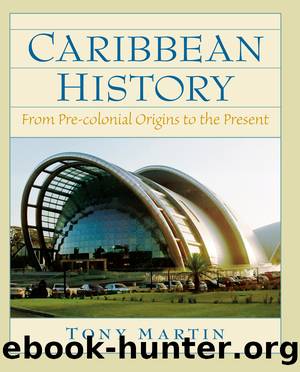Caribbean History by Tony Martin

Author:Tony Martin
Language: eng
Format: epub
Publisher: Routledge
ABOLITIONISTS, AMELIORATION
The sixteenth century produced Bartolomé de Las Casas, one of the great abolitionists of Caribbean history. Those who followed in his footsteps were few and far between. It was only in the late eighteenth century that a critical mass of white persons opposed to British slavery came together. This happened in England. Whites in the Caribbean itself were mostly intransigently opposed to anything resembling a movement against slavery. Two resolutions of the Jamaican Assembly in 1823 called British ameliorative slavery “fanaticism.”
Organized abolitionism coincided with the enslaved’s own violent push for freedom and was inextricably bound to it. The abolitionists also had links to the missionary movement. William Wilberforce, the doyen of the English abolitionists, was a prominent Anglican evangelical Christian.
Among Wilberforce’s collaborators were Granville Sharp, whose advocacy had helped secure Lord Mansfield’s supreme court decision of 1772 outlawing slavery in England. The 1772 decision (Somersett’s Case, involving an enslaved Jamaican who came to England) resulted in the freeing of about 15,000 enslaved Londoners, who quickly became the city’s destitute “Black Poor.” Sharp was instrumental in shipping them off to Sierra Leone in 1787. A number of English prostitutes were tricked on board, plied with liquor and involuntarily sent to Sierra Leone as well. These odd couples became the founding mothers and fathers of British-controlled Sierra Leone, of which John Clarkson, brother of abolitionist Thomas Clarkson, became governor. An 1814 publication described Sierra Leone’s white founding mothers as “chiefly of the lowest order, in ill health, and of but moderate character.”
The pioneer 1787 Society for Effecting the Abolition of the Slave Trade contained nine Quakers and three Anglicans. Sharp and Thomas Clarkson were among the latter. Wilberforce became the main parliamentary voice for the group. Clarkson became their great pamphleteer and historian.
These abolitionists initially confined their advocacy to ending the slave trade, but not slavery itself. Like their counterparts in the United States, who often ran segregated abolition societies, they did not necessarily consider Africans equal to whites. Even so avowed a liberal as J. G. Stedman vociferously disagreed with anything but a very gradual abolition from slavery for the enslaved “savages.” The liberal founding father Thomas Jefferson in the United States favored Emancipation with deportation out of the United States. President Abraham Lincoln took the same position in the 1860s.
The abolitionists were nevertheless very passionate in their propaganda war against slavery. They held public meetings, wrote books and pamphlets and introduced motions in Parliament. By the 1830s Britain was also engulfed in a popular movement which culminated in the Reform Act of 1832, liberalizing the electoral system. It was a good time for radical causes such as abolition.
The abolitionists lobbied successfully for the end of the British slave trade in 1807 and later for the Emancipation Act of 1833. The later phase was spearheaded by the Antislavery Society, formed in 1823 by Wilberforce, Thomas Fowell Buxton, Zachary Macaulay, Thomas Clarkson, Thomas Babington Macaulay and others. Thomas Pringle, who helped Mary Prince write her narrative in 1831, was secretary. Whatever their limitations, these abolitionists brought a genuine missionary zeal to their campaign.
Download
This site does not store any files on its server. We only index and link to content provided by other sites. Please contact the content providers to delete copyright contents if any and email us, we'll remove relevant links or contents immediately.
| Africa | Americas |
| Arctic & Antarctica | Asia |
| Australia & Oceania | Europe |
| Middle East | Russia |
| United States | World |
| Ancient Civilizations | Military |
| Historical Study & Educational Resources |
Pirate Hunter of the Caribbean by David Cordingly(649)
Architecture and Empire in Jamaica by Nelson Louis P(451)
Haitian Connections in the Atlantic World: Recognition After Revolution by Julia Gaffield(436)
Churchill Comes of Age by Hal Klepak(422)
THE HISTORY OF MARY PRINCE, A WEST INDIAN SLAVE by Mary Prince(417)
The Real Pirates of the Caribbean by Colin Woodard(359)
Sugar in the Blood: A Family's Story of Slavery and Empire by Andrea Stuart(352)
Tacky’s Revolt by Vincent Brown(351)
Trinidad's Doctor's Office by Vincent Tothill(342)
Bahamas Bucket List for Divers: Bimini Edition by Nathan Riley(338)
The Spirits and the Law: Vodou and Power in Haiti by Kate Ramsey(327)
The Cayman Islands in Transition: The Politics, History and Sociology of a Changing Society by J.A. Roy Bodden(318)
The Cry of Vertières by Jean-Pierre Le Glaunec(289)
Policing Life and Death by LeBron Marisol;(286)
An Eye For The Tropics: Tourism, Photography, and Framing the Caribbean Picturesque by Krista A. Thompson(277)
Caribbean History by Tony Martin(263)
The New Rum by Bryce T. Bauer(257)
A Brave Vessel: The True Tale of the Castaways Who Rescued Jamestown by Woodward Hobson(256)
A Contemporary Cuba Reader by Brenner Philip; Jiménez Marguerite Rose; Kirk John M(244)
